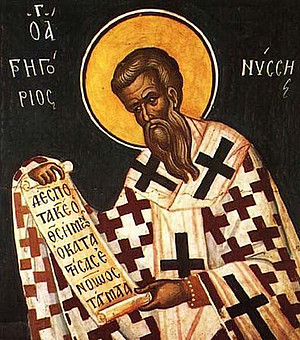Gregory of Nyssa
The younger brother of the luminous Basil and Macrina, G. did not experience quite the same opportunities for education as did his older brother. However, through B.’s teaching and elsewhere, he evidences proficiency in rhetoric and philosophy and knowledge of other arts including medicine. He began as a public rhetorician (364) and appears to have been married (virg, 3). In 372, his ecclesial career was initiated by B. who made him bishop of the insignificant township of Nyssa. G demonstrated a lack of ability as an administrator, eventually being deposed by Arians in 376 under allegations of financial mismanagement. However, he returned in 378. In 379, G. emerged on the scene in the dogmatic struggle against the neo-Arians, Apollinarians, and Macedonians, inheriting the mantle of the leader of orthodoxy from B. He was one of the most prominent participants in synods in Antioch and Constantinople, also writing the majority of his dogmatic works in this 15-year period (379–94). His popularity and success is witnessed by his appointment to deliver funeral orations for Meletius, chairman of the Council of Constantinople, Princess Pulcheria, and Empress Flacilla of the imperial court. He also was entrusted to settle disputes in Jerusalem, armed with the authority of the Council in 381. The period from 386 onwards is not attested, which may imply G. spent more time on his literary works and on the ascetic life.
G. was a prolific writer; some of his more influential works are:
A. Cathechetical-Parenetical: virg (vor 78), prof Chr (the name of X contains all perfections), perf, de anima et res, infant, or. Catech (387 G. claims to render into palatable terms Christian theology for the Jew and the Greek alike), instit (after 390)
B. Dogmatic: tres dei (neo-nicene doctrine of one physis/ousia 3 hyp), Contra Eunomium: this refuted the Apologia apologiae of Eunomius responding to B.’s earlier refutation. G. continues along the same lines as B., emphasizing the incomprehensibility of God’s essence and his work in salvation history. G. here also accuses E. of not giving full appreciation to the mind of Scripture and thus interpreting passages without sufficient regard to context and overlaying them with foreign philosophical concepts. Adv. Arium et Sabellium, fid (divinity of HS), Ad Eustastathium. De sancta Trinitate (380) Adv. Macedonianos. DSS, ordin (failed union with the pneumat), deit (divinity of HS).
C. Exegetical Works: G.’s exegetical works are characterized by allegory, influenced by Origenian interpretation, which emphasize spiritual ascent and effort on the part of the individual but (generally) do so against the background of God’s act in salvation history. Beat (progress), Pss. titt (five parts of the Psalter as steps in the ascent of soul), hom opif; hex (defends B’s exegesis and uses allegory), 8 hom in Eccl (380, interpret Koh 1-3), 5 hom or dom. (PN), ps 6, De vita Moysis: this masterwork of spirituality first offers a historical summary of Moses’ life before offering an allegorical interpretation of the Israelite lawgiver as Christian, or more precisely monastic, exemplar. 15 hom. in Cant (interprets allegorically Cant 1,1-6,9 on Christ and the soul/Church).
D. Feasts: nativ, Steph 1, Steph 2, laud. Bas, bapt. Chr., bapt. diff., Theodor, 40 mart. Sebaste, Res, ascens, Spir (Pentecost), Gr. Thaumat.
E. Biographical: Vita Macrina: G. adapts ancient biography and provides a standard work of hagiography in this work which especially focuses on Macrina’s asceticism and her approach to death. Melet. (381), Pulch (385), Flacill (385/6)
F. Letters: 30. 2 (peregrination to Jer).
G.’s notion that God is infinite may well be his most important contribution to theology. This idea has ramifications both dogmatically and spiritually. Dogmatically, it controverts the Eunomian thesis that God is knowable, providing a philosophical framework for the Cappadocian emphasis on the oikonomia as the way to formulate the doctrine of God. Spiritually, it allowed G. to assert his notion of epektesis, namely that the soul ascends to God through contemplation of him and pursuit of virtue on a path stretching on without limit. His Platonism also informed his ascetic theology, in which he prioritized the spiritual and devalued the corporeal.
G. was widely received in the Byzantine world, especially influencing Ps. Dyonysus, Maximus Confessor, and Gregory Palamas. In the West, little of his material was translated. He occasioned a renewed interest in patristics in the 20th century, attracting the attention of scholars such as W. Jaeger and J. Danielou.
